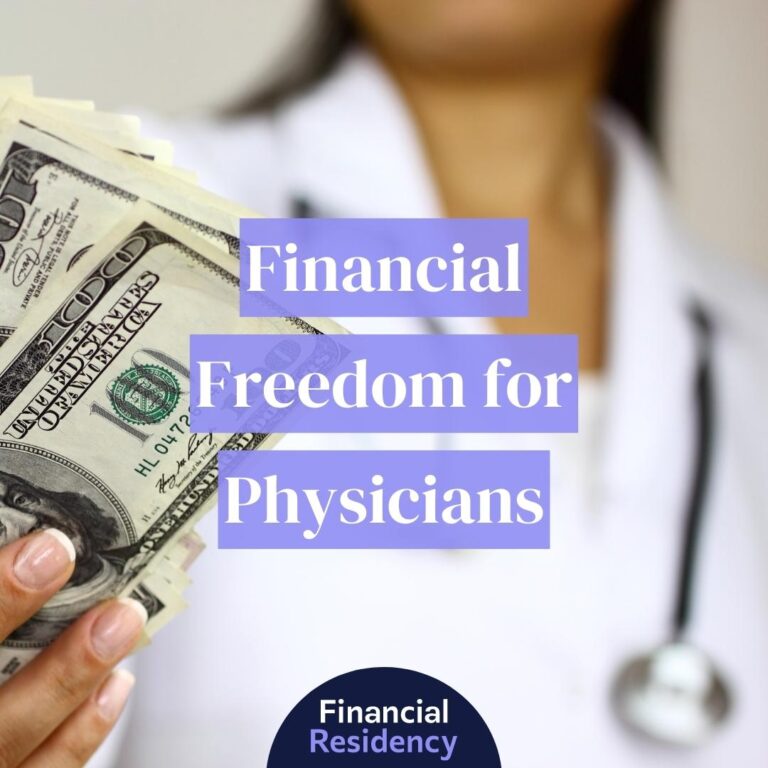To become a physician, you will learn about all aspects of the human body, it’s different systems, and how those systems work together to create you.
Pre-med classes in college prepare you for the science. Once in medical school, you delve in deeper, with gross anatomy, and start gaining clinical experience. You likely learn about patient care, and conducting research.
In short, you learn a tremendous amount of scientific knowledge in a relatively short amount of time, and have to learn it so well that you can make life or death decisions that directly impact patients.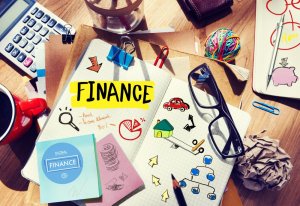
Throughout all of this, your schooling is so rigorous that you likely don’t have time to get enough sleep, let alone fill your time with additional learning. In other words, there is no time throughout your many years of training in pursuit of the role of Doctor of Medicine that you learn about personal finance.
What’s concerning about this is that 79% of students graduating from medical school do so with at least $100,000 in debt. Close to half of newly minted doctors graduate with $200,000 or more in student loan debt.
Think about that: close to half of all doctors start their careers owing the amount of money it would cost to finance a home in many parts of the country and that’s before they have earned their first paycheck.
Yet, nowhere along the pathway to earning the degree of medical doctor does anyone teach medical students how to manage their own finances, let alone how to manage a business. When close to half of physicians are in private practice, one might think that some instruction as to business practices, including finances, might be beneficial.
Financial planning businesses exist because people like me, who do have professional financial knowledge, are dedicated to turn this situation around. We recognize that serving the public as a physician is a noble calling, and that student loan debt is at a crisis level in this country. We want to do our part to share our knowledge so that doctors have a resource to learn more about managing personal finance and taking control of their financial future.
The best way to do this is to work the numbers. Don’t worry, there is very little math involved (though we know that doctors are quite good at math). Instead, the tips below follow several principles that are easy to implement, can change your life once you are familiar with them, yet are not pieces of financial knowledge that you might glean on your own.
1. Keep Score
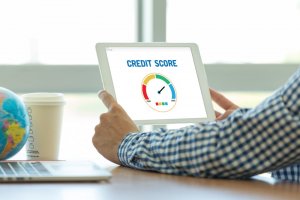 Think of knowing your numbers as getting the baseline of your finances, not unlike getting a baseline of information on a patient’s health. Before you can make meaningful decisions to facilitate change, you first must know from where you are starting.
Think of knowing your numbers as getting the baseline of your finances, not unlike getting a baseline of information on a patient’s health. Before you can make meaningful decisions to facilitate change, you first must know from where you are starting.
Do you know your FICO score off the top of head, or at least the general bracket of where your score tends to hover? If you don’t know your score, or don’t know what a FICO score even is, you have come to the right place.
What Is a FICO Score?
FICO stands for Fair Isaac Corporation, which is an analytic software company that introduced the concept of credit scoring to the world. Using a variety of criteria such as your income, debt, and available credit, the thinking is that the higher your FICO score, the better you are with handling your money. A lower FICO score could indicate issues with debt or money mismanagement.
Lenders Fannie Mae and Freddie Mac started using FICO scores in 1995 to determine whether applicants could qualify for a mortgage loan. The higher your score, the better (lower) your interest rate tends to be.
FICO scores range from 300 to 800+. Most consumers have a FICO score of 579 or lower, which means they are considered a high risk for lenders. People with scores in this range tend to be denied credit or are offered loans at the highest interest rates.
On the other end of the spectrum, any score over 800 is considered exceptional. Only 1% of consumers have scores in this bracket, and they are considered the lowest risk to lenders. They tend to get the most competitive (lowest) interest rates.
How Do You Find Out Your FICO Score?
To find out your FICO score, you likely need go no further than your credit card company. If you have a card with a major company, such as Citibank or Chase, a common feature for cardholders is to include your credit score, available for easy access any time you log in.
Everyone is also entitled to check their credit score once a year for free from each of the three major credit bureaus: Experian,Equifax, and TransUnion. Set a calendar alert on your phone to request a free credit report as a recurring item once per year.
How Can You Protect Your Credit Score?
Pay your bills on time, try to limit any further borrowing, at least until you can talk to us, keep your credit card balances low and your limits high. Never cosign a loan. Review your credit report once a year to ensure you have not been the victim of identity theft, and to correct any errors that might be there.
2. Know Your Net Worth
Your net worth is the value of your assets minus your liabilities. There are some great calculators available online for free to determine your net worth.
What Are Assets?
You probably have more assets than you might think. In addition to the obvious (cash, retirement accounts), any jewelry of value and many household goods and appliances can count as assets as well.
What Are Liabilities?
Liabilities are anything you owe. A car or a house can be both an asset and a liability at the same time, depending on what you owe.
For example, if you own a car worth $10,000, but only owe $3,000 left on your loan, your car is actually an asset worth $7,000 because you could theoretically sell it for $10,000, pay off the loan, and have $7,000 cash in hand.
On the other hand, if you owe $10,000 but your car is worth $12,000, then the car is a $2,000 liability because if you sold it for full value, you would still owe $2,000 to pay off the loan.
Why Do You Need to Know Your Net Worth?
To really take ownership of your finances, it’s critical that you know your starting point. How can you make decisions about what you might need to pay off or adjust if you don’t know for sure what you have?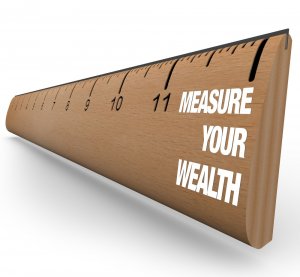
3. Maximize Your Cash Flow
Your cash flow is the process of money coming in and going out over a set period of time. Every month you earn a paycheck – that’s your money coming in. Every month you have fixed expenses – that’s your money going out. You also likely have some incidental and discretionary spending in there, too. This in and out process is known as “flow” because there is no set start or stop. Your earning and spending are on a continuous loop.
How Do You Get Your Cash Flow Under Control?
A budget is the best way to manage your cash flow. Many people find budgets limiting, but really, a budget is simply your cash flow in written form. It’s just information about money that comes in, and money that goes out.
Mindful Spending
Once you have your budget written down, you can start thinking about your financial choices. Look at your bottom line of income, and consider your wants and needs in terms of expenses. Consider a long term goal like paying off your student loans. Every time you are about to buy something on impulse, pause and really think it through. Ask yourself: does making this purchase get me closer to or farther from my goals? Spending money is perfectly fine, as long as your choices are meaningful to you in terms of getting you closer to meeting your goals. Once mindful spending becomes a habit, you might be surprised at how much easier it is to save money without feeling deprived.
4. Think Big Picture
Look ahead over the next year, and decade, and career, and lifetime. The best time to plan for the future is now. Remember, just because you write a budget plan now does not mean that the plan can’t change. You can change your mind, and your goals, at any time.
Understand Your Debt
Understanding your debt big picture is perhaps the biggest key to developing healthy financial habits. What led you to make the decisions that you did in terms of borrowing? Do you feel you got something of value in return for that debt? Do you have a plan for annihilating that debt and moving towards financial freedom? (If not, give us a call. We can help with that.)
Good Debt Versus Bad Debt
Since you’re here reading this blog, you clearly have an interest in understanding, and tackling, debt. Good for you! You probably also have quite a lot of debt, as most doctors do. Did you know there is such a thing as good debt?
Think about it this way: cars are not good investments. We buy them to serve a need – transportation – and not because we think we’ll make any money off the deal. Because we won’t. Cars are almost always liabilities in the financial sense, but that doesn’t mean they are not valuable. They simply have a value in terms of their function, not so much in terms of their monetary value.
But, it’s rare that anyone has the cash on hand to buy a car outright, so we finance them and pay back the loan over time. This means taking on debt, but the debt serves a purpose and helps you take a step closer to achieving your big picture goals by allowing you the means to get to and from your job.
Where the car loan shifts into bad debt is if you buy something you can’t afford to comfortably pay for every month. Choosing a car outside of your means results in a higher monthly payment, premium gas, and more expensive repairs.
This holds true with other large expenses, such as a mortgage. Homeownership has many positives and is generally not achievable without taking on some debt. There are tax benefits to home ownership, the property has investment potential, plus there is peace of mind in providing you with a secure and stable place to live. The key, just like with buying a car, is to purchase a house that is in a price range you can reasonably manage.
5. Set Your Priorities
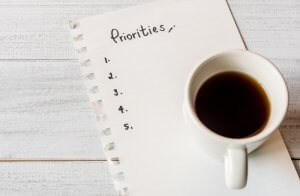 Everyone’s financial situation is different, just as everyone’s financial goals are different. Some people want to prioritize paying off debt over all else, while others would like to find a way to buy a house sooner rather than later. Some people would like to prioritize financing a trip to Paris. Your priorities are 100% your choice. What’s important is that you identify them. Don’t just let them swirl around in your head. Write them down. Say them out loud. Don’t worry – you can always change them later.
Everyone’s financial situation is different, just as everyone’s financial goals are different. Some people want to prioritize paying off debt over all else, while others would like to find a way to buy a house sooner rather than later. Some people would like to prioritize financing a trip to Paris. Your priorities are 100% your choice. What’s important is that you identify them. Don’t just let them swirl around in your head. Write them down. Say them out loud. Don’t worry – you can always change them later.
Saving Over Spending
If you’re not sure where to start, we recommend prioritizing saving over spending. This does not mean you don’t get to enjoy life. Instead, it’s quite the opposite. Think about the many things in your life that you have purchased but do not use or really enjoy. You can probably look around the room and find several examples right now. Instead of having a bunch of things that do not bring you joy, imagine the feeling of empowerment you would have if you had dollars instead. Then, think about the power of those dollars once they earn compound interest or are invested in the stock market or help reduce your debt.
Mindset Matters
Lest you think it’s impossible to change your life to a more saving mindset over a spending mindset, keep in mind that your actual finances don’t need to change to make this work. All you have to do is rethink your situation. You have already identified your goals, so when you have a choice between buying the more expensive Audi when the less expensive Honda will do just fine, remember that your choice isn’t about having less car, it’s about having more control over your money.
Think Long-Term
Cultivating a saving mindset doesn’t happen overnight. If the end goal of buying the house or paying off the student loan or drinking champagne in Paris seem too far away and unreachable, that’s only because you don’t yet have a working plan to realize your financial goals. A financial planner can help craft a long-term plan with specific milestones and goals that take your earnings into potential so you don’t feel overwhelmed. Then, you simply follow the plan, focus on your end goal, and remember to save not spend wherever you can. It really is that easy.
Just Get Started
We frequently talk with clients who feel like it’s too late for them to make a dent in their finances. The student loan debt is too great, life is too short, and they feel like it’s just too hard. There is no magic secret to taking control of your finances. The way to make it happen is this: just get started. Make one small change today in how you handle your money. Make one choice to save five dollars instead of buying the latte you don’t really want but are in the habit of buying. Put five dollars into a savings account and don’t worry that it doesn’t seem like enough.
Maximize Your Benefits
Always get the full match in retirement money from your employer. To do otherwise is to leave money on the table. Your retirement benefits are part of your compensation and are an important component of your long-term financial plan. It’s not uncommon for people to feel that they have so much debt and so little income that they need every penny they can get and cannot bear taking 2 or 5 percent out of their already meager paycheck to put into an investment account they can’t touch for many years. If you feel this way, give us a call. We can put together the math to show you how you can make it work without that 2 or 5 percent in your paycheck now, and how much it will benefit you to save that money long-term.
Moving Forward
Now that you are armed with the foundational concepts of financial literacy, you are ready to take some next steps. Know your numbers: learn your FICO score, track your spending, and write that budget. Determine your net worth. It’s hard to know where you’re going if you don’t know where you’re starting.
Then, think about ways big and small to maximize your cash flow. This is where we come in. We’re happy to chat about ways that we can help you find opportunities to maximize your budget and develop a plan to meet your financial goals.
Work on developing a saving versus spending mindset. This becomes a habit very quickly and you might be surprised by how big an impact you can make on your bottom line with this one simple change.
And, just get started. I am confident we can map out a long-term plan to help you breathe a little easier, buy more of the things you want, and ultimately meet your financial goals.

